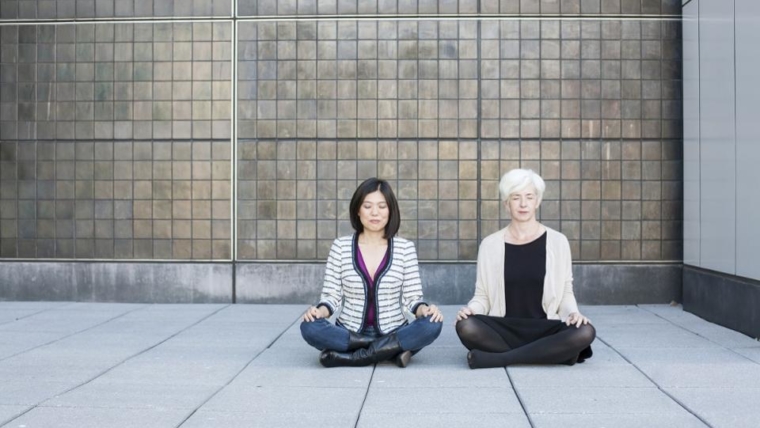
Study: Mindfulness Meditation Works as Well as Common Antidepressant to Reduce Anxiety
The research adds more evidence to the use of mindfulness as a powerful mental health tool.
Fact checked by Nick Blackmer
Fast Facts
- Practicing a certain form of mindfulness helps relieve symptoms of anxiety as well as a popular antidepressant, new research shows.
- In a new clinical trial, mindfulness-based stress reduction (MBSR) was as effective as escitalopram (Lexapro) in treating anxiety disorders in some people.
- As a treatment for anxiety, MBSR had fewer side effects, but the practice was more difficult to maintain.
Mindfulness meditation—a practice including breath awareness and body scanning—is as effective at treating anxiety as a commonly-used antidepressant, new research shows.
The randomized clinical trial, published in JAMA Psychiatry, is the first of its kind to compare the effectiveness of mindfulness-based stress reduction (MBSR) to escitalopram (Lexapro) for people with anxiety disorders.1
The research adds to a growing body of data that shows how practicing mindfulness can be a powerful and effective treatment for anxiety.
“Our study provides evidence for clinicians, insurers, and health care systems to recommend, include, and provide reimbursement for mindfulness-based stress reduction as an effective treatment for anxiety disorders because mindfulness meditation currently is reimbursed by very few providers,” lead study author Elizabeth Hoge, MD, director of the Anxiety Disorders Research Program and associate professor of psychiatry at Georgetown University Medical Center, said in a news release.2
Further, mindfulness-based practices may be more accessible to some patients, and may potentially give people more treatment options.
“A big advantage of mindfulness meditation is that it doesn’t require a clinical degree to train someone to become a mindfulness facilitator,” Dr. Hodge said in the news release. “Additionally, sessions can be done outside of a medical setting such as at a school or community center.”
Mindfulness Shown to Reduce Anxiety Symptoms With Fewer Side Effects
For the new research, Dr. Hoge and her team at Georgetown University Medical Center initially recruited 276 people diagnosed with one of four types of anxiety disorders—generalized anxiety disorder, social anxiety disorder, panic disorder, or agoraphobia.
Of those 276 people, 208 completed the trial, and ranged in age from 18 to 75 years old, with a mean age of 33. The participant pool was 75% female, and the majority were white (60%).
At the beginning of the trial, participants were assigned to one of two groups: the escitalopram group or the MBSR group. Those assigned to the escitalopram arm were given a daily dose of 10-20 mg; the MBSR group was prescribed an 8-week MBSR practice.
The MBSR program required participants in this group to attend 2.5-hour group classes twice a week for eight weeks, in which qualified MBSR instructors taught several forms of mindfulness meditation, including breath awareness, body scans, and mindful movement. Participants also attended one full-day meditation retreat and were asked to practice meditating for 45 minutes a day for the entire eight weeks.
“We wanted to compare Lexapro in its best format to meditation in its best possible format to get a precise handle on what the data would show,” Dr. Hoge told Health.
She said it’s important to note that MBSR is a specific mindfulness intervention—it focuses on observing thoughts and emotions without judging or dwelling on them—and therefore, the results of this study can only be applied to this particular practice. Other meditation practices, like Zen meditation which focuses on relaxation, cannot be applied here.
At the end of the eight weeks, Dr. Hoge and her team used the Clinical Global Impressions scale, a standard questionnaire that clinicians use to evaluate mental health, to assess how well each intervention was working. Both groups reported an average 30% reduction in anxiety symptoms by the end of 8 weeks.
“The drug works great. But it’s not for everyone, some people might be particularly hesitant about side effects,” said Dr. Hoge
About 80% of people in the medication group reported at least one side effect, including increased anxiety, trouble sleeping, decreased libido, headaches or nausea, though most reported mild side effects. Ten people dropped out of the study due to medication side effects.
About 15% of people in the mindfulness group reported increased anxiety, which was the only side effect reported in this group. No one in this group dropped out.
There was one significant caveat: Mindfulness therapy took a lot of time and effort. It can also be an intense experience. If mindfulness-based therapy might be a good fit for you, Dr. Hoge recommends seeking out a professional trained in MBSR rather than trying to go at it alone.
“I would not recommend doing it on your own as a first step because there are so many things that come up when someone starts to meditate for the first time. When questions come up it can be so valuable for people who are trying to do this sometimes difficult practice,” said Dr. Hoge.
Mindfulness Can Interrupt Anxious Thought Patterns
Although the new study was the first clinical trial to directly compare medication and mindfulness as treatments for anxiety disorders, mounting research on the topic for the past decade has suggested mindfulness and meditation can help rework a person’s relationship with their anxiety for the better.
A study published last year in the journal PLOS One included 190 medical professionals who work in emergency rooms. The researchers found that those who practiced mindfulness were less likely to experience both anxiety and depression.3
Additionally, a review in Current Psychology, also published last year, included 11 studies on mindfulness and anxiety in an attempt to determine how the practice works to reduce symptoms.4
Researchers found that both MBSR and another mindfulness practice called mindfulness-based cognitive therapy (MBCT) appear to be universally effective at curbing symptoms of anxiety and depression in people with anxiety disorders. They theorized that mindfulness does this by allowing a person to become more aware of their thought processes and eventually interrupt them.
Anxiety disorders are characterized by habitual worrying thoughts about the future—typically revolving around bad outcomes and a person’s inability to control larger aspects of their lives.
“People with anxiety disorders experience a sense of loss of control and lose their sense of internal agency and ability to change,” Stephen Ferrando, MD, director of psychiatry at Westchester Medical Center and chairman of psychiatry at New York Medical College, told Health. “Their focus is outward and on the future.”
Mindfulness, however, brings people back to the present—through breath and body awareness, along with moving meditations—to help better regulate the body’s stress response to those future thoughts, and rewire how a person relates to anxiety.
“The mind and body work together,” said Dr. Hoge. With anxiety, for example, anxious thoughts can trigger a physiological response, like increased heart rate or breathing—which can then trigger even more anxiety.
“That sort of thing snowballs,” said Dr. Hoge. “[But] with meditation, people can practice not letting the thoughts be overwhelming and learn to put them aside.”
It’s important to note that learning how to control these thoughts doesn’t mean not having them at all, according to Dr. Hoge. Rather, it means shifting one’s mindset from allowing worries to take control of their mind and body, to recognizing that they are having an anxious thought, acknowledging it, and letting it pass without causing a reaction.
This interrupts the feedback loop before it even starts, according to Dr. Hoge, who recommends reframing a thought like “I’m scared I’m going to fail this exam” to “I’m having a thought about failing this exam.”
“[That] creates a bit of distance between the person and the thought that is causing anxiety,” said Dr. Hoge
Mindfulness-Based Therapy May Not Be Right for Everyone
Taking a mindfulness-based approach to quelling anxiety symptoms may be more time-consuming and difficult to stick with for some people. In the study, people were more likely to continue antidepressant use than their MBSR program.
Though the initial completion rate for both MBSR and escitalopram patients were similar (75% for MBSR; 76.5% for medication), MBSR participants tended to drop off faster as time went on. At the 12-week follow-up, only 49% of MBSR participants continued meditating, compared to the 78% who continued medication treatment. By the 24-week follow-up, 52% of participants were still taking escitalopram while only 28% were still regularly practicing mindfulness meditation.
“It is important to note that although mindfulness meditation works, not everyone is willing to invest the time and effort to successfully complete all of the necessary sessions and do regular home practice, which enhances the effect,” Dr. Hoge said in the news release.
Mindfulness-based therapy is also not necessarily a relaxing practice—in fact, “it can be somewhat provocative,” said Dr. Hoge.
“You are taking away the distractions in life and allowing whatever is underneath to emerge. For people who are dealing with specific anxiety symptoms like panic attacks, I would recommend cognitive behavioral therapy, which is directly targeted for anxiety symptoms, instead of mindfulness,” said Dr. Hoge.
According to Dr. Ferrando, who was not involved in the new research, anxiety disorders often exist alongside other conditions, such as depression, and some people will benefit more from medication than mindfulness-based interventions.
“Not all patients, such as those with psychosis or an unstable mood disorder, or severe post-traumatic stress, can actually participate in mindfulness until their symptoms are reduced,” he said.
While future research will eventually look into virtual or app-based MBSR, as well as other mindfulness-based interventions, the study authors say the current research supports mindfulness meditation as an evidence-based treatment option for adults with anxiety disorders.
Sources
- Hoge EA, Bui E, Mete M, Dutton MA, Baker AW, Simon NM. Mindfulness-based stress reduction vs escitalopram for the treatment of adults with anxiety disorders: a randomized clinical trial. JAMA Psychiatry. Published online November 9, 2022. doi:10.1001/jamapsychiatry.2022.3679
- Georgetown University Medical Center. Mindfulness-based stress reduction is as effective as an antidepressant drug for treating anxiety disorders.
- Westphal M, Wall M, Corbeil T, et al. Mindfulness predicts less depression, anxiety, and social impairment in emergency care personnel: a longitudinal study. PLoS One. 2021;16(12):e0260208. doi:10.1371/journal.pone.0260208
- Maddock A, Blair C. How do mindfulness-based programmes improve anxiety, depression and psychological distress? a systematic review. Curr Psychol. 2021. doi:10.1007/s12144-021-02082-y







